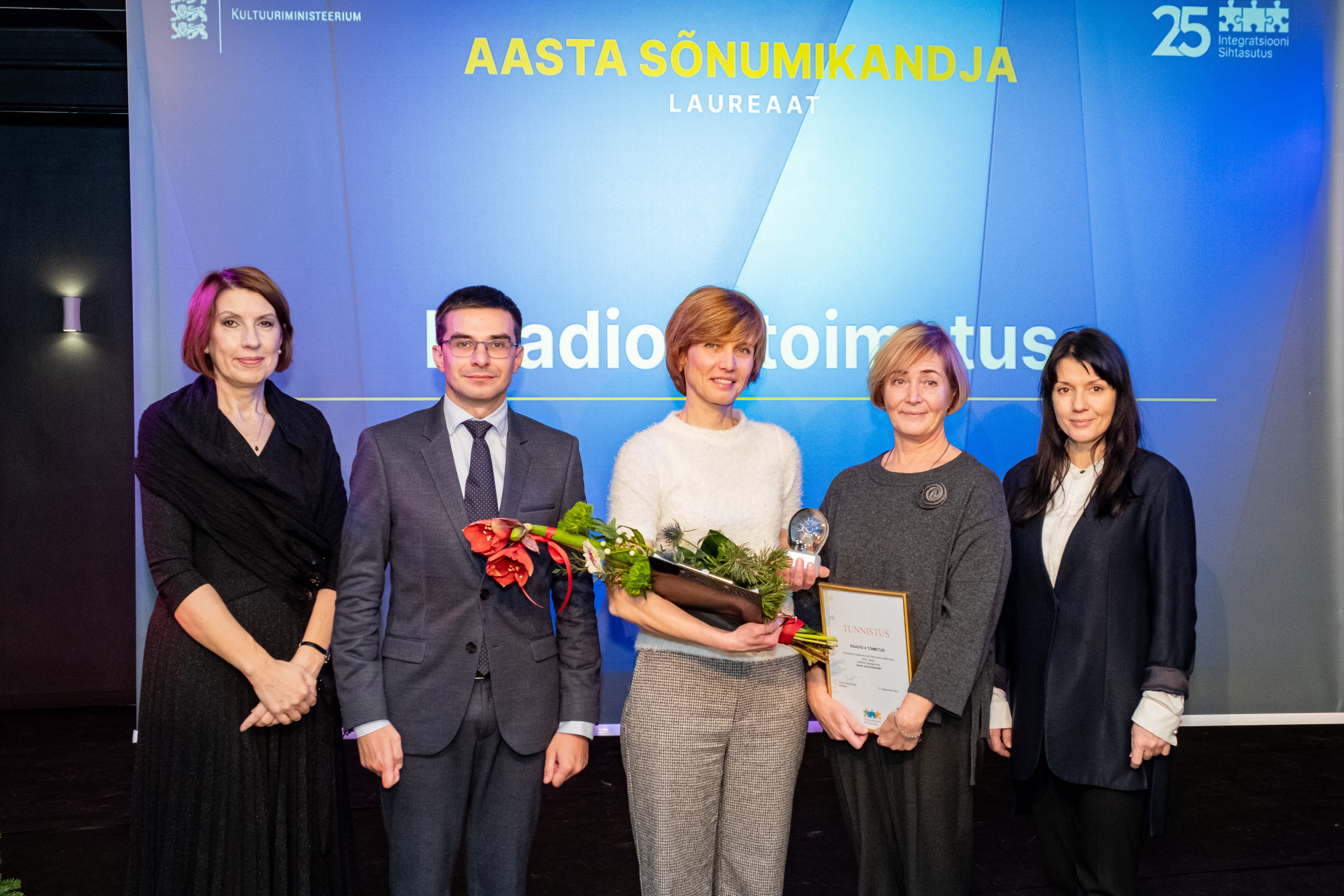At this year’s Integration Awards ceremony, the title Messenger of the Year 2023 was given to the editorial staff of Raadio 4. Raadio 4, the most popular Russian-speaking radio channel in Estonia, which celebrated its 30th birthday this year, has been dedicated to supporting non-Estonian listeners in Estonian society throughout the years. The editorial staff has been facilitating the mutual communication, understanding, and respect of the communities every step of the way. The audiences have been treated to shows of the ethnic minorities living in Estonia, as well as shows about Estonia which connect different communities. The award was given for the show Hüvasti, relvad! (Farewell to Arms) for its consideration of different points of view.
Read more about the editorial staff of Raadio 4 in the interview below.

Why have you decided to contribute in this field and why do you find such work important?
Raadio 4 celebrated its 30th birthday this year. We have been engaged in activities facilitating integration all these years. It is important that other ethnic groups living in Estonia receive the same kind of information as Estonian-language listeners do. We want our listeners to have their say and engage in discussions to be able to be a part of the life, culture, and history of Estonia.
How have you personally contributed in this area and where have you felt that you have truly succeeded?
An overview of our activities: we have provided Estonian language lessons (the shows Naljaga pooleks, Rääkimine on kuld, Keelekõdi) and published books, CDs, and DVDs as study material for Russian-language schools prepared on the basis of our shows, such as Eesti Rahvakalender (Estonian Folk Calendar) based on the shows of Jüri Kuuskemaa, Vana Tooma Lood (Tales of Old Thomas) by Jüri Nikiforov, and the history show Hüvasti, 20. sajand! (Farewell to the 20th Century) by Hardo Aasmäe. For all of these 30 years, we have also made shows for the minority groups living in Estonia (Ukrainians, Belarusians, Jews, Georgians, Armenians, Tatars, and so on). Over the past five years, we have made shows about the history, culture, and heritage of Estonia every year. I would like to highlight some of them: Eesti taldrikul (Estonia on a Plate) was a summer show where we introduced Estonia through culinary experiences; Якоря не бросать! was a broadcast series about Estonia’s maritime history and our famous ships; Иди на свет talked about Estonia’s lighthouses; Застывшая музыка discussed our architectural gems (the Arvo Pärt Centre, the Estonian National Museum, Fotografiska, the Maarjamäe memorial for victims of communism, Haapsalu Castle, Thule Koda in Saaremaa, Narva College, Põhjala Factory, and so on); Jelena Skulskaja’s literature series Литературный диксиленд was about Estonian children’s literature. This year, we aired three new series of Hüvasti, relvad!, which spoke about our military history through 11 military museums across Estonia; Арт-альбом featured Estonian artists who introduced their vision and world view through their creative work.
What do you see as the major challenges in the field of integration?
The information in the Russian-language information space, including on social media, is oftentimes oriented towards disinformation and the creation of negative attitudes. This has a negative effect on the Estonian society, including our defensive ability and the efficiency of the integration process.
What is the significance of this year’s award for you? What kind of strength will it give you for the future?
Each recognition has an uplifting effect – it makes you feel like you are doing the right thing and gives strength to keep going.
Who are the people who have helped and inspired you in your work this year and in general?
The entire staff of Raadio 4 and, of course, our loyal listeners.
How do you evaluate your work today and how do you intend to proceed in the future?
We are certainly very unique and the feedback from listeners has shown that they are very pleased with what we offer. We are planning a new powerful culture project already for this summer, but it is currently still in development.
Things do not always go according to plan. What kind of recommendations would you give to other people for such moments? How to stay inspired in the face of difficulties?
When things fail or do not work out the way you wanted, you should never give up and should try again.
Next year will be dedicated to cultural diversity. What does cultural diversity mean to you personally and where is it expressed in Estonia?
One part of it is the country we live in, its culture and heritage. The other part is the diversity and the simultaneous similarity of all the ethnic minorities living in Estonia – together, they form the common part of our lives, our cultural diversity.
